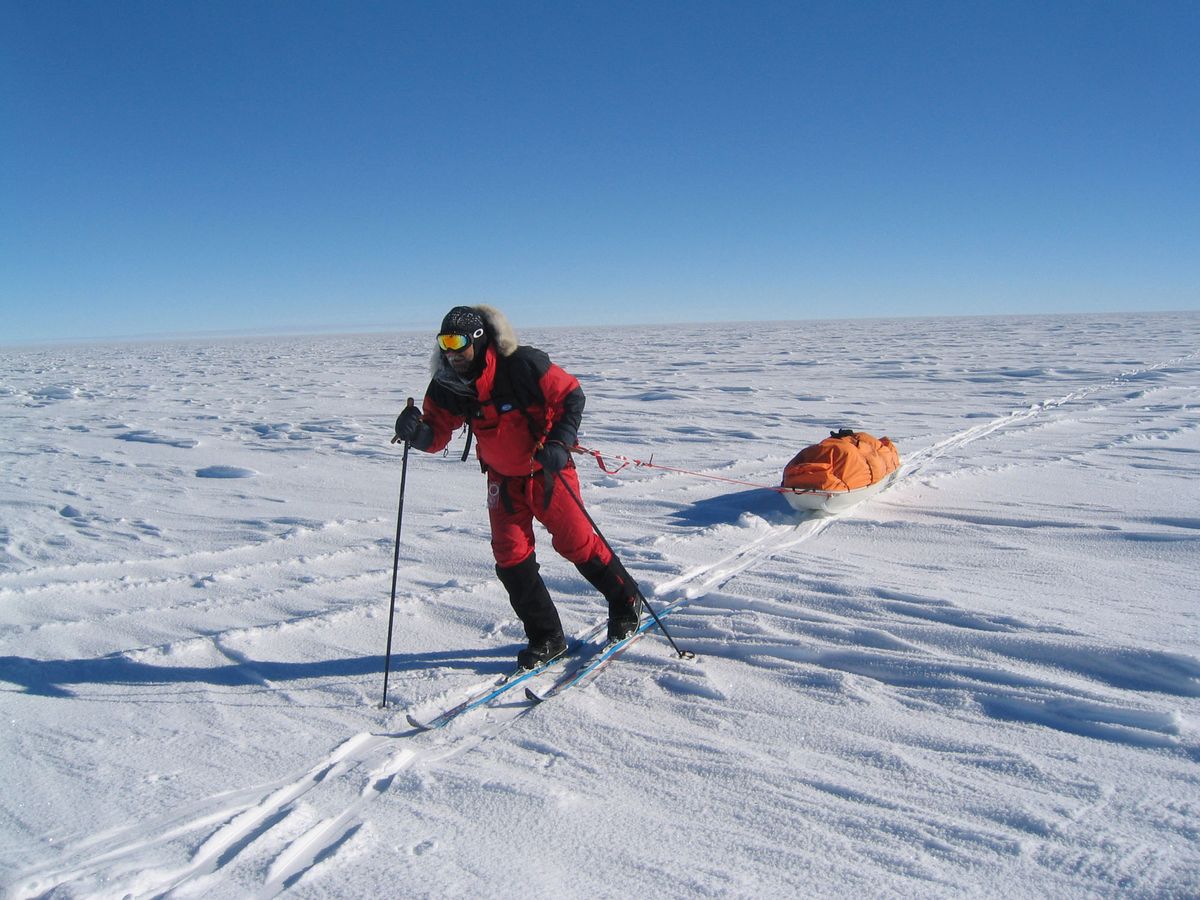Ferris grad slogs in race to South Pole
Todd (McLaughlin) Carmichael, a Spokane native who lives in Philadelphia, was on track this week to set an unassisted solo speed record for pulling “The Pig” and trekking 700 miles to the South Pole. Photo courtesy of Todd Carmichael (Photo courtesy of Todd Carmichael / The Spokesman-Review)
A Spokane native was on track this week to set a speed record – possibly this weekend – for trekking 700 miles to the South Pole in less than 40 days.
On the ice since Nov. 12, adventurer Todd Carmichael, 44, has been traveling solo, unaided and unsupported while averaging 18 miles a day on foot and skis through Antarctica’s notoriously ragged terrain and frigid weather.
Carmichael, a 1982 graduate of Ferris High School, owns a Philadelphia coffee roasting business. He was known as Todd McLaughlin, using his stepfather’s last name, when he ran on Ferris’s 1981 state champion cross-country team.
“He’s trying again on a route he attempted last year to set a two-man record,” said Carmichael’s oldest sister, Lisa Wolfe, who lives in Spokane and works at Spokane Community College. “The English explorer he was with hurt his leg early in the trip, but Todd learned a lot in that experience.
“My brother is an adventurer at heart. He’s done a number of things in his life that are truly extraordinary, like going through Africa for weeks and sailing through South Pacific islands for months…and being lost at sea overnight without a boat off the coast of France.”
He practices and preaches low-carbon, self-sufficient travel, she said.
“He said that before he got any older, he wanted to do one really big adventure. He thought about climbing Mount Everest but said a lot of people do that. So he selected something so big and remote that few people have done it.”
Indeed, if Carmichael succeeds, he’ll be the first American and only the fifth person to solo without aid on the route from the Antarctic coast at Hercules Inlet to the South Pole.
While an attempted interview via satellite phone did not work out this week, Carmichael sounded tired but guardedly confident in recorded dispatches that he would reach the pole on Saturday or today to beat the 2007 record of 39½ days set by Hannah McKeand of the United Kingdom.
Plagued with gale-force winds and equipment troubles in the first days of the trek, he had indicated some discouragement about beating the record. But improvised repairs to ski bindings, poles and other gear have enabled him to focus on putting icy miles behind him while pulling a sled – he calls it The Pig – that weighed about 250 pounds at the outset.
“He’s kind of a MacGyver person; he even jury-rigged his communications system to stay in contact,” said Wolfe. “But he’s been frustrated by a broken ski binding.”
Carmichael celebrated Thanksgiving with three freeze-dried dinners – Mac and cheese, chili mac with beef and beef stew – after a brutal 19-mile day.
“I couldn’t see the ground I was walking on,” he said in a recorded dispatch. “I literally fell hundreds of times. The sled rolled over so many times I stopped counting.”
At Camp 32 on Dec.12, he summarized the day in a word: “Hell: that rounds it out … cold, windy, harsh, soft snow, unrelenting climbing.”
For days he had to pull The Pig uphill to elevation 10,000 feet onto the Antarctic Plateau, battling the effects of altitude at his rapid pace as well as the terrain.
The biggest challenge at that point was pulling The Pig around crevasses and through wind-sculpted “sastrugi” – ridges formed when wind erodes and drifts the snow.
At Camp 33 on Dec. 14, Carmichael’s satellite phone dispatch compared the day to “swimming out through crashing waves.”
At Camp 34 on Dec. 15 – just 93 miles from the South Pole – he reported another setback that limited him to about 19 miles in very tough going.
“I hit a bog of sick, ugly snow,” he said, noting that he was having trouble and wasting precious sleep time while melting enough of the fluff to make water at camp.
“(The snow) is like talcum powder, moon dust and laundry detergent,” he said.
Even though he’s consumed food and fuel to make The Pig lighter, “The sled felt heavier than it did on Day 1,” he said, noting that he’d been warned about this late-journey phenomenon by other polar trekkers. “If not prepared, it would be heartbreaking,” he added.
His brother-in-law, Brian Hart in Philadelphia, spoke with Carmichael by satellite phone that night and elaborated: “Each step sees his boot sink deep into the peculiarly sticky and rough snow, but he has made the decision that continuing ahead on foot is still more effective for him than attempting to use the skis with the repaired bindings.”
While Carmichael was at a pace to beat the record, another day or two of bad snow conditions or a turn in the weather could easily put him off the mark.
Planning for a polar trek requires serious attention to detail. Planning for a speed record reduced the margin for error virtually to nil, Hart said.
“Todd reports that food and fuel consumption are right on target,” Hart said. With too much weight, a soloist couldn’t move the sled through rough terrain. But coming up short on supplies could be fatal should injury or prolonged storms bog him down in a region where rescues can be difficult, costly and prolonged.
“He’s a real endurance kind of guy,” said Wolfe, who noted that Todd grew up with three sisters. “He’s always been our mascot; we just adore him,” she said.
“He has the will of iron, sleeping only four hours a night now and dragging that sled 18 hours a day.
“Pushing his body to the limit really appeals to him. We don’t know why.”

